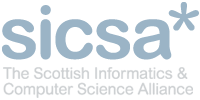By Cristina Adriana Alexandru and Felipe Costa Sperb
14 November 2024
On the 4th of October 2023, a team of academics from the University of Edinburgh, led by Felipe Costa Sperb and Cristina Adriana Alexandru, launched the School of Informatics Computer Science Education (CSE) Group. This event, sponsored and endorsed by SICSA, aimed to enhance the visibility of the group, attract prospective members, initiate conversations on Computer Science Education topics, and create opportunities for networking.
The CSE Group has the mission to inspire and to bring together staff and students with an interest in Computer Science Education from the University of Edinburgh, as well as from other universities in the UK and beyond. The aims of the CSE group are:
- To enhance knowledge and practice of Computer Science Education by keeping abreast of advancements in this field;
- To guide teaching practice by sharing practical experience and research evidence from the Computer Science Education community;
- To conduct research linking pedagogical theory and advancements with evidence-informed practice;
- To engage and collaborate with other related groups in the University of Edinburgh, in the UK and more widely;
- To disseminate research and findings from practice to impact Computer Science Education in the University of Edinburgh and beyond.
The launch event was organised as a mini-conference style. The agenda was as follows:
- 10:45 AM – Opening note: Welcome and Introduction to the CSE Group, by Felipe Costa Sperb (University of Edinburgh)
- 11:00 AM – Keynote presentation: Evaluating the Sense of Belonging of Undergraduate Computing Students in the UK and Ireland – An Invitation to Collaborate, by Catherine Mooney (University College Dublin), Brett Becker (University College Dublin), and Fiona Mcneill (University of Edinburgh)
- 12:00 PM – CSE presentation: Providing Students Opportunities to Learn about Accessibility and Designing for Inclusion, by Aurora Constantin (University of Edinburgh)
- 12:40 PM – Closing note: Membership of the CSE group, Closing Notes and Discussion, by Cristina Alexandru (University of Edinburgh)
- 1:00 PM – Closing celebration: Networking Reception and Lunch
The organisers are thrilled to report that the launch event of the CSE group was a success. It yielded several noteworthy outcomes, each contributing to the advancement of the group’s mission and impact. The event registration page attracted substantial interest, resulting in a large number of registrations and attendance not only by peers affiliated to the University of Edinburgh, but also from other distinguished universities in the UK and Ireland, including University of Glasgow, University of Strathclyde, University of St Andrews, University College Dublin, and Technological University Dublin. This extensive network expansion has opened up exciting opportunities for research collaboration, dissemination and knowledge exchange, fortifying the CSE Group’s standing in the academic community. It also led to the doubling of the group’s membership (originally consisting of the organisers and a few colleagues from the School of Informatics), and the welcoming of the group’s first associate member intake coming from the University of Strathclyde, the University of Glasgow, and University College Dublin. This increase in membership highlights the appeal and relevance of the group’s initiatives and activities. The Keynote Session showcased successful research in Computer Science Education, providing valuable practical insights for peers embarking on research in this field. It also served as a call to action for evaluating student sense of belonging in higher education. Finally, the event had a significant impact on promoting awareness of the pivotal role that Computer Science plays in improving accessibility and inclusivity in education and the workplace.
The organisers are very grateful for SICSA’s considerable support and endorsement! Following the success of the launch event, the CSE group has been very active in planning an exciting future to keep advancing on its mission and aims. Key initiatives include the implementation of a regular schedule of Teaching Hours events (featuring talks from CSE group members and guest speakers on different Computer Science Education topics), members’ meetings (to provide members with a space to foster networking, knowledge exchange, and opportunities to get involved in advancing the group’s mission), and the formation of research sub-groups based on the different research interests of our members.
If you would like to learn more about the CSE group or become a member to join us in sharing knowledge and practice, inspiring and shaping the future of Computer Science Education, get in touch with us at: lcostas@ed.ac.uk











